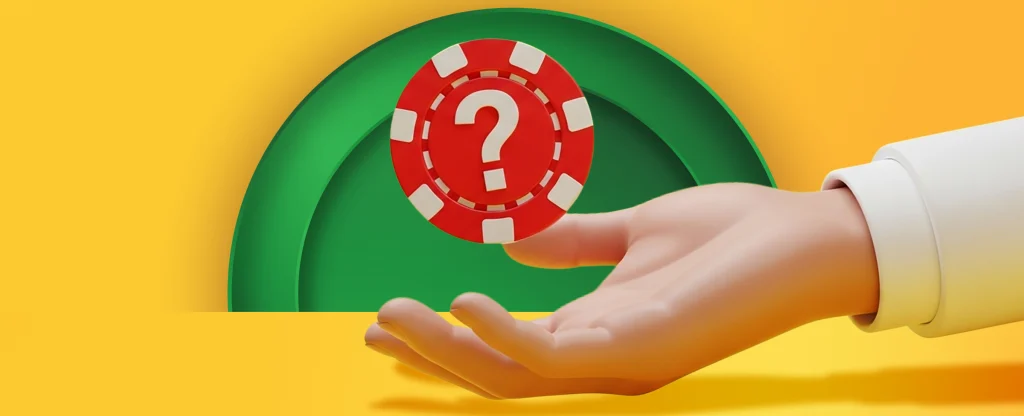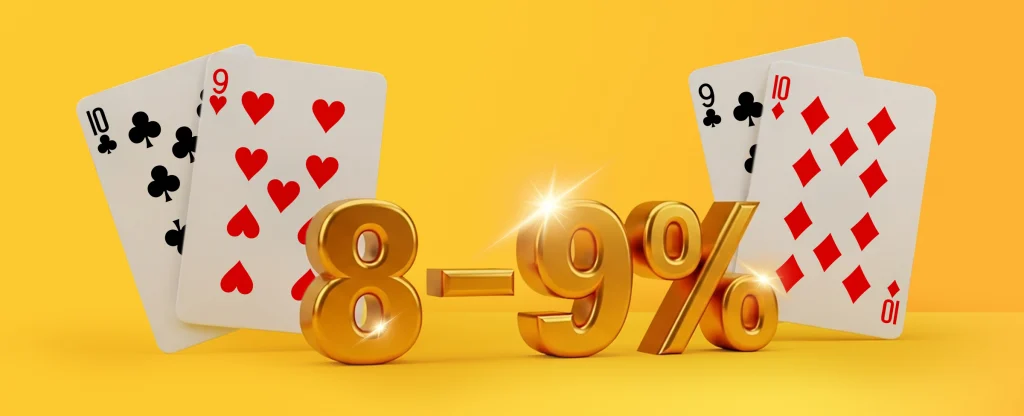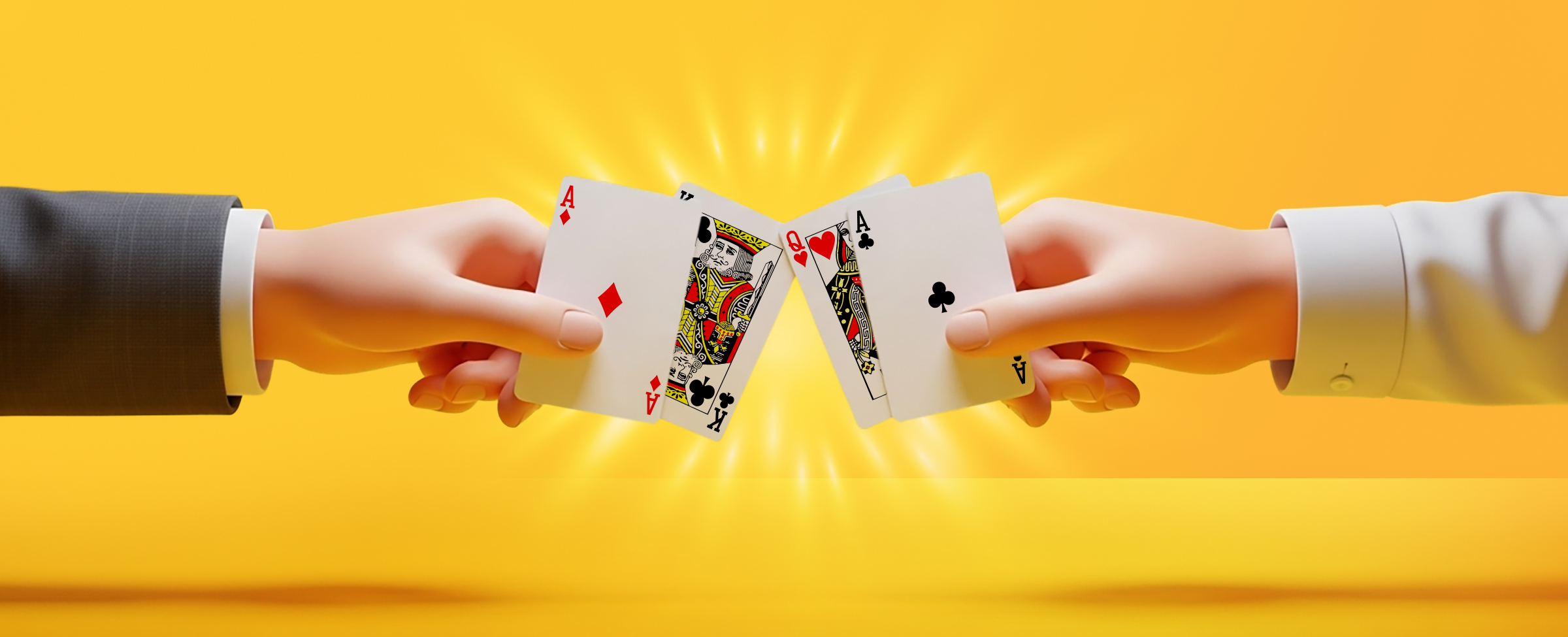Blackjack is one of the most popular casino table games here at Joe Fortune and for lots of reasons. It’s fast, fun, and there’s a bit of strategy involved that gives players a real shot at winning. But if you’re new to the game, you might’ve heard a few terms that leave you scratching your head. And one of the terms we often get asked about is “What is a Push?”
So, what is a push in blackjack, and what does it mean for your bet? Here we break it down in simple terms, furthermore we’ll also look at how frequently it occurs, what it means when a blackjack (natural 21) is involved, and whether it’s something to worry about when you’re at the table.
Push in Blackjack Explained
A push in blackjack happens when both you and the dealer finish the hand with the same total score and it’s not a bust hand. Most commonly, this is when both the player and the dealer have a hand that adds up to 18, 19, 20, or even 21, but neither side goes over 21. When this happens, the round is considered a tie. Your original bet is returned to you, and no money is won or lost.
For example:
- You’re dealt a hand that totals 20.
- The dealer flips over their cards and has 20.
- Result: Push. You don’t win, but you don’t lose either.
- It’s basically a draw like shaking hands and moving on to the next round. Your chips stay exactly where they started.

Is a Push in Blackjack a Loss?
No, a push is certainly not a loss. It might feel like a bit of a letdown especially if you were hoping to win but you haven’t lost any money. Think of it like this:
- If you win, you get your original bet back plus winnings.
- If you lose, the dealer takes your bet.
- But in a push, you get your original bet back, and that’s it.
- It’s a neutral outcome. Your balance doesn’t change. It might not be exciting, but it’s certainly better than losing your bet.
- Just remember, a push only returns your main bet. If you’ve placed any side bets, those might still win or lose depending on what they were for.
If You’re Dealt a Natural Blackjack
A natural in blackjack is when you’re dealt an Ace and a 10-value card (10, Jack, Queen, or King) as your first two cards. That’s an automatic 21 and unless the dealer also has a natural, you usually win straight away and get paid 1.5x your bet. But what happens if the dealer also has a natural? If you both have a natural, then it’s a push.
For example:
- You’re dealt Ace + King = 21
- Dealer flips over Ace + Jack = 21
- Result: Push. Your bet is returned. No win, no loss.
- There is no doubt it is a buzzkill, especially when you thought you’d scored the perfect hand. But these are the rules and the casino doesn’t pay out for a tie.
If the Dealer Has a Natural and You Don’t
Now, here’s where it stings a bit. If the dealer has a natural (21 on their first two cards), and you don’t, then it’s an automatic loss for you even if you’ve got 20 or two face cards in your hand. It does not matter how close you are.
For example:
- You’ve got 10 + Queen = 20
- Dealer flips over Ace + Jack = 21
- Result: You lose your bet.
- The only time you’ll push in this situation is if you also have a natural, i.e. both hands equal, both naturals = push.
- This rule is why many players take insurance when the dealer shows an Ace, though in the long run, insurance usually works out better for the house than for players.

Blackjack Push Probabilities
So, how often does a push happen in blackjack? It’s not that common, but it’s not rare either. On average, it is about 8-9% of hands in blackjack which end in a push. That means out of every 100 hands you play, roughly 8-9 of them will be a draw where neither you nor the dealer wins or loses. The chances go up a bit when you’re playing basic strategy and hitting hands that regularly score 18–20. These are strong totals that the dealer often hits too, especially with rules that force the dealer to hit on soft 17 (a hand like Ace + 6).
Pushes are most likely to happen when:
- Both you and the dealer land on 20
- You both have 19
- You both hit 21, especially if neither is a natural
- It’s frustrating to push with a strong hand, but it’s all part of the game.
How Rare Is a Push in Blackjack?
Pushes aren’t exactly rare, but they’re not happening every second hand either. As mentioned, the general push rate is around 8/9%, give or take depending on the table rules and the number of decks in play. Here are a few things that affect how often a push might happen:
- Number of decks. The more decks = more possible card combinations = slight increase in pushes.
- Dealer rules. If the dealer hits on soft 17, more hands go to 18–21, increasing the chance of ties.
- Your own playing style. If you always stand on 18 or higher, you’re more likely to run into the dealer tying with you.
- Game variation. In blackjack variants like Pontoon or Spanish 21, pushes are handled differently or might not exist at all. Be sure to check out the range of Blackjack Games at Joe Fortune to see which version you might enjoy best.
- Even though they’re not super rare, pushes are generally a small part of the overall game experience. They’re not really something you can predict or avoid, they just happen now and then.

Why Do Pushes Matter to Players?
At first glance, a push seems harmless. No win, no loss, just keep on playing and carry on. But over time, pushes can affect your long-term results, so let’s explain why:
- If you’re betting big, you might feel like you missed out on a potential payout.
- You might be one good hand away from going up, and a push slows your momentum.
- In bonus situations or wagering requirements, pushes might not help you progress.
- Emotionally, some players treat a push like a non-win, which can lead to chasing wins or betting more next round.
- The key is to treat a push as what it is a draw. It is not a loss; it is not a win. Let’s just call it a breather before the next hand.
Final Thoughts: Should You Worry About Pushes?
Pushes are part of blackjack. It is as simple as that. They’re not good, they’re not bad. They just happen when your hand and the dealer’s hand are equal. As a player, there’s not much you can do to avoid them. The best thing you can do is:
If you’re dealt a strong hand like 20 and end up in a push, it can be a bit of a letdown. But it’s also better than losing your bet. On the flip side, sometimes a push saves you from what looked like a loss, say when the dealer makes a comeback and ties you with a lucky draw. At the end of the day, blackjack’s about playing the odds and keeping a cool head. So, when you get a push, take it in stride, your chips are still on the table, and the next hand’s already on the way.
